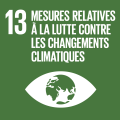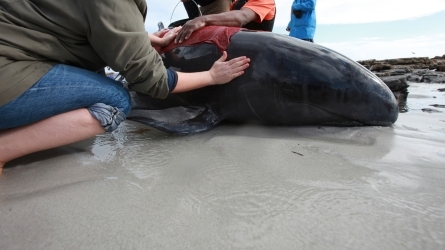
Building the future of Euskadi from Research and Innovation
Description
The new "Euskadi 2030 Science, Technology and Innovation Plan" (2030 STIP), represents the Basque Country's strategic commitment to Research and Innovation. This commitment has been maintained over the last three decades and now, in the 2030 horizon, it will promote R&D&i as a lever for the Basque economy to improve its competitiveness and move forward on a path of sustainable growth, bringing with it tangible results, which be visualized by Basque society. The vision is to place the Basque Country among the most advanced European regions in innovation in 2030, and the objective is to improve the standard of living and the quality of employment. This is a shared strategy in which public institutions, companies, universities, research centers, technology centers and socioeconomic agents participate. A commitment to promote science, technology and innovation and accelerate the transition towards a digital, green and inclusive Euskadi.
The purpose of the Summer Course is to socialize and disseminate the contents of the new 2030 STIP, bringing it closer to the public, through the development of presentations and round table discussions, around its strategic pillars:
- Scientific Excellence,
- Industrial Technological Leadership,
- Open Innovation,
- and as a core element, Talent.
These four elements are essential and must contribute in a joint and balanced way so that the results of the research are transformed into social and economic results.
Objectives
Socialize and disseminate the contents of the new 2030 STIP, bringing it closer to the public, through the development of presentations and round table discussions, around its strategic pillars.
Activity directed to
- University student
- Teachers
- Professionals
- All public
Methodology
TheSummer Course will be developed around the three strategic pillars, plus talent, through a presentation followed by a round table discussion on each of the pillars:
- Scientific Excellence,
- Industrial Technological Leadership,
- Open Innovation,
- Talent.
Program
14-07-2022
Registro
Institutional Opening session. Speaking order:
- Cristina Uriarte Toledo | Eusko Jaurlaritza / Gobierno Vasco - Zientzia, Teknologia eta Berrikuntzarako komisionatua / Comisionada para la Ciencia, la Tecnología y la Innovación
- Eva Ferreira Garcia | UPV/EHU - Errektorea / Rectora
- Iñigo Urkullu Renteria | Eusko Jaurlaritza / Gobierno Vasco - Lehendakari
SESIÓN: LA EXCELENCIA CIENTÍFICA
La investigación de excelencia como base para crear y difundir nuevos conocimientos, capacidades, tecnologías y soluciones
“Ciencia, semilla transformadora“
- Pedro Miguel Echenique Landiribar | UPV/EHU - Catedrático de Física de la Materia Condensada y Presidente del DIPC
Round table: “Contribución de la Excelencia Científica al futuro de Euskadi, una mirada desde lo local hacia lo global“
La investigación de excelencia y de vanguardia, la internacionalización, las grandes infraestructuras singulares y la colaboración como palancas para mejorar la base de conocimiento y abordar los desafíos asociados a la triple transición
- Ricardo Díez Muiño | DIPC - Director del Donostia International Physics Center (DIPC) (Moderator)
- Aitziber Lopez Cortajarena | CIC biomaGUNE - Directora Cinetífica del Centro de Investigación Cooperativa-CIC BiomaGUNE
- Juan José Gómez Cadenas | DIPC - Ikerbasque Research Professor en el DIPC
- María Vallet Regí | Universidad Complutense de Madrid - Catedrática de Química Inorgánica Universidad Complutense de Madrid
- Nekane Balluerka Lasa | UPV/EHU - Catedrática del área de Metodología de las Ciencias del Comportamiento (UPV/EHU)
Pausa - café
SESIÓN: EL LIDERAZGO TECNOLOGICO INDUSTRIAL
Las inversiones empresariales en I+D e innovación, la llave para lograr resultados e impacto socioeconómico y contribuir al posicionamiento internacional
“La inversión tecnológica como elemento generador de negocio“
- Andrés Arizkorreta García | CAF - Presidente de CAF y Vicepresidente del Círculo de Empresarios Vascos
Round table: “Contribución del Liderazgo Tecnológico Industrial a la mejora del nivel de vida y la calidad del empleo“
Impulso de proyectos tractores estratégicos de I+D+i en colaboración público-privada y orientados a las grandes transiciones, que hagan de Euskadi un polo de atracción de inversiones de alta intensidad tecnológica
- Javier Ormazabal Echevarria | VELATIA - Presidente de VELATIA y Presidente del círculo de Empresarios Vascos (Moderator)
- Andrés Arizkorreta García | CAF - Presidente de CAF y Vicepresidente del Círculo de Empresarios Vascos
- Jesus Valero | TECNALIA - Director General de Tecnalia
- Lourdes Moreno | Bolueta Engineering - Directora General de Bolueta Engineering
- Nerea Aranguren Achotegui | Danobat Group - Directora de Innovación de Danobat Group
15-07-2022
SESIÓN: LA INNOVACIÓN ABIERTA
Innovación abierta y trabajo en red, un reto y una oportunidad para el siglo XXI. Los beneficios de la cooperación internacional
“Innovación abierta y transformadora en la UE y en el ecosistema Vasco de innovación “
- Xabier Goenaga Beldarrain | JRC - Jefe de la Unidad de Conocimiento en el ámbito de Finanzas, Innovación y Crecimiento ( Joint Research Centre of UE)
Round table: “Innovación abierta como palanca para lograr dimensión competitiva “
Colaboración ciencia- tecnología-empresa para trasladar el conocimiento de vanguardia al mercado e impulsar la innovación hasta la última milla, en beneficio de las pymes. La colaboración con otros ecosistemas internacionales de innovación
- María José Aranguren Querejeta | ORKESTRA - Directora General del Orkestra (Moderator)
- Leire Bilbao Elgezabal | Innobasque - Directora General de Innobasque
- Igor Campillo | UPV/EHU - Director de Euskampus
- Maria Luisa Arriola Nieto | BIC GIPUZKOA BERRILAN - Directora Gerente de BIC GIPUZKOA BERRILAN
- Begoña Beobide Azpeitia | iraurgi Berritzen - Directora de Iraurgi Berritzen
Pausa - café
SESIÓN: TALENTO
Formación, atracción, recuperación y consolidación de Talento, ingrediente fundamental para lograr el liderazgo en ciencia, tecnología e innovación
“Atracción de talento científico: retos y oportunidades“
- Fernando Cossio Mora | Ikerbasque - Director Científico de la Fundación Vasca para la Ciencia Ikerbasque
Round table: “El Talento, la base del futuro de Euskadi“
Talento investigador y tecnológico. Mejora de competencias, fomento de la educación STEAM y la incorporación de la mujer a los ámbitos científico-tecnológicos.
- Fernando Cossio Mora | Ikerbasque - Director Científico de Ikerbasque (Moderator)
- Ivan Jimenez Aira | Bizkaia Talent - Director Gerente Bizkaia Talent
- Ainhoa Ondarzabal Izaguirre | Basque Trade Investment - Directora General de Basque Trade Investment
- Marta Macho Stadler | UPV/EHU - Profesora Agregada de Geometría y Topología de la UPV/EHU
- Tatiana Suarez Cortés | FAES-FARMA - Directora de Promoción de Investigación FAES-FARMA
Directors

Cristina Uriarte Toledo
Eusko Jaurlaritza / Gobierno Vasco, Comisionada para la ciencia, la tecnología y la innovación
Doctor of Chemical Sciences, University Professor and Accredited as University Professor by ANECA, she has been Commissioner for Science, Technology and Innovation of the Basque Government since September 2020. Previously, she was the Director of External Relations for the Gipuzkoa campus of the UPV/EHU (2001-2004) in which position, among others, she managed and developed a Program for the promotion, advice and support for the creation of innovative companies and technological base at the UPV/EHU, and has drawn up various proposals for the management and operation model of the R&D&i spaces. She has subsequently been Vice-Rector of the Gipuzkoa Campus of the UPV/EHU (2004-2012). At the same time, she has been a member of the Executive Councils of Advanced Entrepreneurship and Gipuzkoa Berritzen of Innobasque, member of the Board of Directors of the Gipuzkoa Berritzen Association, member of the Executive Committee of the Donostia-San Sebastián Strategic Plan, and President of the Delegate Commission of the same Plan (2008–2012), among others. Subsequently, she has been Minister of Education, Language Policy and Culture of the Basque Government (2012-2016) and Minister of Education of the Basque Government (2016-2020).
Speakers

Nerea Aranguren Achotegui
Doctor in Strategic Innovation (2012 Mondragon University) and Industrial Engineer (1997 TECNUN. University of Navarra). With more than 20 years of experience in the world of R&D&i, she currently combines the Department of Innovation and New Business Promotion of DANOBATGROUP with the Management of IDEKO, the BRTA Technology Center where he has developed his career. Likewise, it represents these organizations in different Councils and Forums of interest in its field of specialization, such as: • President of SAVVY, industrial digitization solutions • Member of the BCN3D Board of Directors, additive manufacturing. • Member of the Board of Directors ENDITY Solutions. • Sole Administrator of INGUMA, Competitive Intelligence. • President of UPTEK, association of Startups for Advanced and Digital Manufacturing in AFM Cluster. • President of the CFAA Business Association, Aeronautical Advanced Manufacturing Center. • Vice President of the Basque Artificial Intelligence Center. She is a member of the juries for the “Ada Byron to the Technological Woman” award granted by the University of Deusto and “Connected Industry 4.0” organized by the Ministry of Industry, Commerce and Tourism.
Mari Jose Aranguren is the general director at Orkestra and Professor in Economics at Deusto University. She has worked at Orkestra since its beginning in 2006. Mari Jose is a recognised expert in the area of competitiveness and territorial strategy, cluster and networks, and the analysis and evaluation of policies, having published several books and articles in specialised national and international journals of impact. She has vast experience in leading national and international projects in the research areas previously mentioned and has worked closely with different agents of the Basque Country. In December of 2016 Mari Jose received a special recognition from Harvard’s Institute of Strategy and Competitiveness for her career and contribution to territorial competitiveness. From 2014 to 2016 Mari Jose was a member of the Advisory Group for the European Commission as part of the Horizon 2020 programme, in the Societal Challenge 6 ‘Europe in a changing world – Inclusive, Innovative
Andrés Arizkorreta García
He was born in San Sebastián in 1956. He has a degree in economics from the commercial university of Deusto. He entered construction and auxiliary railways s.a. –CAF in 1980. He has developed his professional activity in this company, occupying various positions of responsibility within its organization. He has been CEO from 2006 to September 2021. In December 2015 he was appointed president of the company. He is a member of various official bodies: Member of the board of directors of the circle of Basque businessmen, of the board of trustees of the Donostia International Physics Center foundation. He is a director of the Basque Institute of Competitiveness and of the Deusto business school. He is a member of the strategic council of the CEIT – center of studies and technical research of Gipuzkoa. He is a member of Jakiunde, the Academy of Sciences, Arts and Letters of the Basque Country. In addition; He was president of the Cluster of Knowledge in Management, (1996/2001), professor at the center for improvement of senior management and companies (1998/2002) and lastly a member of the executive committees of ADEGI and Confebask.

Maria Luisa Arriola Nieto
Directora Gerente BIC Gipuzkoa
Degree in Geography and History from the University of Salamanca, Master in People Management from the UPV/EHU and PDG – IESE. He has developed his professional career in the field of professional services to companies, specializing in advanced productivity improvement services and process reengineering in companies such as MCC, CAF, Quirón Clinic, Salvesen Group, Talgo, Caser, ABB Niessen. Managing Director of the business development and entrepreneurship center BIC Gipuzkoa Berrilan since 1998, center of the ANCES network, supporting the launch of new technological and innovative companies. She is also a visiting professor in the Master's Degree in Psychology of Organizations and Psychosocial Intervention at the Public University of the Basque Country and the MBA-EMBA at the University of Deusto-Bilbao, and has given numerous talks on entrepreneurship and intrapreneurship strategy in educational centers, institutions and organizations both nationally and internationally. Chosen as "best director of Gipuzkoa 2021" by the Association of Guipuzcoan Businesswomen, Professionals and Directors (ASPEGI), she is also President of the Association Against Cancer in Gipuzkoa.

Nekane Balluerka Lasa
University of the Basque Country, Teacher and researcher
Graduate (1989) and doctor (1993) in Psychology from the UPV/EHU, both times with Extraordinary Prize, where she has been a professor since 1989. Vice-Dean of the Faculty of Psychology (2004-2006), Vice-Rector for Teaching Quality and Innovation ( 2006-2009) and Postgraduate Studies and International Relations (2012-2016), member of the University Commission for Teaching Evaluation (2007-2012), and member (209-2012) and president (2012-2013) of the Ethics Committee for Research and Teaching Practice with human beings of the UPV/EHU. Rector of the UPV/EHU (2017-2021). He directs the Qualiker research group (group A of the Basque university system). Visiting researcher at three foreign universities. He has participated in 51 research projects (in 14 as IP). Co-author of 124 scientific articles, 28 books and 10 book chapters and nearly 60 invited conferences and 200 contributions at national and international conferences. His lines of research focus on the methodology for the preparation and intercultural adaptation of psychological evaluation instruments, on multilevel analysis models and on the design, implementation and evaluation of programs to promote socio-emotional competencies.

Begoña Beobide Azpeitia
Iraurgi Berritzen
Telecommunications Engineer from the Higher Technical School of Engineering of Bilbao (University of the Basque Country) and Executive MBA from the IE Business School of Madrid. He spent the first 3 years of his professional career in the telecommunications sector, as a project manager in the Cable Television Area of Euskaltel S.A. Starting in 2001, he moved to Madrid to work in the Audiovisual Sector, first at Via Digital, and later at Sogecable S.A. as Technical Director of the Cable Area, while complementing her technical training with the Executive MBA from the IE Business School, publishing several articles in different forums and blogs managed by the same business school. In 2006 she returned to San Sebastian to work as the Commercial and Marketing Director of the Vicomtech Technology Centre, and since September 2010 she has been the Director of Iraurgi Berritzen, the Urola Erdia Regional Development and Innovation Agency. Linkedin : https://www.linkedin.com/in/begonabeobide/

Leire Bilbao Elgezabal
CEO of Innobasque, a private-public association with 1,000 partners, where he is in charge of managing new innovative challenges in order to help position the Basque Country as a leading innovation region in Europe. Member of the councils of the Basque Center For Applied Mathematics BCAM and the Basque Center on Cognition, Brain and Language. BCBL. Her professional career has been developed both in private industry where she has worked for companies such as Valpipe International, BEP International in Great Britain, I kusi-Angel Iglesias SA, and Ingeteam, as well as in Public Administration, as Director of Innovation at DZ Centro de Design, belonging to the Department of Innovation and Economic Promotion of the Provincial Council of Bizkaia and Director of Technology of the Basque Government (X legislature), where she led the competitiveness and R&D&i policy and the policies of the European Union, managing programs of the PCTI and promoting actions linked to the creation and implementation of strategic technological and innovative infrastructures. Leire Bilbao is a Computer Engineer from the University of Deusto with training in Advanced Management from IE Business School and Senior Business Management from IESE Business School.

Igor Campillo
Euskampus Fundazioa, Director
He is director of Euskampus Fundazioa, founded in 2011 by the University of the Basque Country (UPV-EHU), Tecnalia Corporation and the Donostia International Physics Center (DIPC). He worked as assistant professor in the Faculty of Sciences of the UPV/EHU, international projects manager in Gamesa Energy, researcher and project manager at LABEIN- Tecnalia, project and outreach manager in the Nanoscience Cooperative Research Center- nanoGUNE, manager of the nanoBasque Strategy in the Basque Business Development Agency- SPRI, and director of DeustoTech. He holds a PhD in Physics from UPV/EHU, and a master degree in journalism and science communication from the Spanish Open University. He is the author of more than 70 international scientific publications indexed in the Web of knowledge,and author of 3 international patents. He has been awarded as one of the word-leading “Boundary Spanners” for University Business Cooperation by the University Industry Innovation Network.

Fernando Cossio Mora
UPV/EHU-Ikerbasque, Catedrático de Química Orgánica
Degree in Chemical Sciences from the University of Zaragoza (1982). Doctor in Chemical Sciences from the UPV/EHU (1986). Professor of Organic Chemistry at the UPV/EHU. He has been Dean of the Faculty of Chemistry / Kimika Fakultatea (1999-2001) and Vice-rector for Research and International Relations at the UPV/EHU (2001-2003). Since 2009 he has been the Scientific Director of Ikerbasque, the Basque Foundation for the advancement of science. Author of 230 international publications, 11 international invention patents and 5 books). Most relevant awards and distinctions: Almirall Award from the Spanish Society of Therapeutic Chemistry (1987), Euskoiker Award (2005), Ignacio Rivas Medal from the Royal Spanish Society of Chemistry (2011), Janssen-Cilag Spain Research Award from the Royal Society Spanish of Chemistry (2013). Corresponding academic of the Royal Academy of Exact, Physical-Chemical and Natural Sciences of Zaragoza (2016). Awarded with a Synergy grant from the European Research Council (ERC) in 2020 and Euskadi Research Award 2020
Ricardo Díez Muiño holds a PhD degree in physics by the UPV/EHU. He further developed his scientific career in the University of Bordeaux (France) and the LBNL (Berkeley, USA). He is currently Research Scientist at the Centro de Física de Materiales CFM (CSIC-UPV/EHU) and the Director of Donostia International Physics Center (DIPC). He served as Deputy Director of CFM between 2005 and 2011 and as Director of CFM from 2011 to 2015. His main fields of research are chemical physics and condensed matter theory, in particular molecular dynamics at surfaces, the theory of electronic excitations, and the theory of photoemission and photoelectron diffraction. He has published more than 100 scientific articles, as well as two books. Ricardo Díez Muiño has been the organizer of 4 international conferences and has been part of the organizing committee in 4 additional conferences. He is Vicepresident of Euskampus Campus of Excellence and Board Member of CIC nanoGUNE.
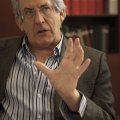
Pedro Miguel Echenique Landiribar
Prince of Asturias Award for Scientific and Technical Research 1998, he is a professor of Condensed Matter Physics UPV/EHU and the author of more than 400 publications in specialized magazines and books. Honorary President of Jakiunde, founding President of the CIC Nanogune and the Materials Physics Center MPC, Vice President of Euskampus, of the UPV/EHU, President of the DIPC and director of Graphenea. He was Minister of Education and Culture and spokesman for the Basque Government 1980-84. Member of the Royal Academy of Sciences, the Lombard Institute, Academy of Sciences and Letters of Milan, and the Académie Royale de Belgique, and honorary member of the European Physical Society, He has received various awards, such as the Munibe awards, Euskadi, Dupont, Prince of Viana for Culture, Max Planck, Iberdrola, Nacional Blas Cabrera, Cifra Boada for Scientific Communication, Sabino Arana and Liberpress Camins, the Grand Cross of Alfonso X the Wise, the Gold medal from Navarra, from Gipuzkoa, of the Royal Society of Physics, the UPV/EHU and the City of San Sebastian. Doctor honoris causa from various universities, doctor in Science from Cambridge 1998, he was named Universal Basque of the Year and Favorite Son of Villa de Isaba 1998
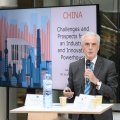
Xabier Goenaga Beldarrain
Comision Europea - JRC
Xabier Goenaga Beldarrain, Head of the Knowledge for Finance, Innovation and Growth Unit at the Joint Research Centre of the European Commission. The Unit he leads represents the JRC in European Semester country teams responsible for identifying policy challenges of the EU Member States as well as for assessing and monitoring their Recovery and Resilience Plans. His team evaluates the economic and labour market impacts of a number of EU programmes at regional level using the RHOMOLO model. His team assesses trends at Member State level regarding productivity and high growth enterprises, smart specialisation strategies at regional and national level, and industrial innovation. It also monitors and assesses industrial, trade and innovation developments in China vis-à-vis the EU. In the past, he was responsible for the European Commission services in charge of the coordination of research policies of Member States, management of agro industrial research and management of SMEs programmes of the EU Framework Programme. He graduated from the Basque Country University in 1982, holds a PhD in chemical engineering from the University of Wales and a Master degree in Public administration from the École Solvay in Brussels.
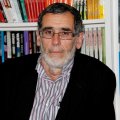
Juan José Gómez Cadenas
Ph.D. in 1987 at the University of Valencia. Scholar at the Stanford Linear Accelerator Center, Harvard University, the University of Geneva and CERN. In Spain, he has been a professor at the University of Valencia and a professor at the CSIC. In 2018 he moved to the DIPC in Donostia, as Ikerbasque Professor. He has been a leading experimenter in particle physics for over twenty years. In 2009 he proposed NEXT to the Canfranc Underground Laboratory (LSC) in Canfranc. The goal of the experiment, widely recognized as one of the pioneers in the field, is to discover neutrinoless double beta decays in Xe-137. He is currently the spokesperson for the experiment. In 2016 he was a co-recipient, as a member of the K2K and T2K collaborations of the Breakthrough Prize in Fundamental Physics. Gómez-Cadenas received an ERC Advanced Grant in 2013 to develop the first NEXT demonstrator and an ERC Synergy Grant (in 2019), together with Prof. F. Cossío (UPV/EHU) and Prof. R. Guenette (U. Harvard/U. Manchester) to develop new fundus reduction techniques. He has published 261 articles, supervised 15 doctoral theses and has been a member of numerous international conference advisory panels and various scientific committees.

Ivan Jimenez Aira
Bizkaia Talent
Degree in Law (Legal-Economic Specialty) from the University of Deusto, 1999; Master of Business Administration, MBA, 2001 at Deusto Business School; Executive Master in Business Analytics. EMIBA. (2020-2021) by ESADE Business School. Since September 2011, Managing Director of Bizkaia Talent, creator of the Be Basque Talent Network, and Co-founder of the European Talent Mobility Forum (together with Berlin partners, Copenhagen Capacity, Move to Gothenburg, Turku Business Region, Braindport-Eindhoven, Talent Scotland, Work in Estonia), an alliance of European leaders in territorial talent management. He has written special chapters in the "Global Talent Competitiveness Index" years, 2017 and 2018 and 2020, and a unique special mention in the presentation of the index in 2019 in Davos as a world innovative case. Recognitions (2021): INNOVATION AND EXCELLENCE AWARDS 2021: TALENT MANAGEMENT ORGANIZATION OF THE YEAR (CORPORATE LiveWire: UK); 50 MOST INFLUENTIAL COMPANIES OF THE YEAR (USA); 20 MOST INNOVATIVE LEADERS TO WATCH IN 2021 (USA); BEST TERRITORIAL TALENT MANAGMENT EUROPEAN COMPANY (INTERNATIONAL BUSINESS MAGAZINE: Dubai); BEST TALENT MANAGEMENT COMPANY IN EUROPE (WORLD BUSINESS OUTLOOK : Singapore)

Aitziber Lopez Cortajarena
CIC biomaGUNE, Directora Científica
PhD in Biochemistry from the UPV/EHU (2002), she has published more than 100 international scientific articles, 5 invited book chapters, 6 reviews, holds 5 patents and has edited 2 invited books. Leader of more than 15 research projects, highlighting those granted by the European Research Council (ERC) and the coordination of a competitive European Project FET-Open-eProt; national projects of the State Research Agency and regional projects of the Basque Government, for health and for projects of special urgency due to the coronavirus pandemic. Her international participation in evaluation committees, editorial committees (editor of a journal published by the American Chemical Society, and currently senior editor of the journal Protein Science) and other bodies such as the Executive Council of the International Protein Society, or the vice presidency of the Biophysical Society of Spain. It has trained and supervised 14 postdoctoral researchers, 17 predoctoral researchers, 21 master's students, 23 undergraduates and is committed to promoting science among women, participating in numerous activities such as STEAM Euskadi, the International Day of Women in Science, and the Emakumeak Zientzian initiative.
She is a professor at the University of the Basque Country UPV/EHU and holds a PhD in Mathematics from the Claude Bernard University of Lyon. She is a topology specialist. Interested in the dissemination of science, she has been participating for years in various activities at universities, scientific institutions, cultural or educational centers. She collaborates in medias, such as the program La Mecanica del Caracol on Radio Euskadi or the Network of Communicating Scientists of El Periódico in collaboration with the Esteve Foundation. She is the editor of the Women with Science blog of the Chair of Scientific Culture of the UPV/EHU. In 2015 she received the University of Alicante Equality Award and one of the Medals of the Royal Spanish Mathematical Society in its first edition. In 2016 she was awarded the Emakunde Prize "for her scientific career aimed at disseminating and promoting the approach of mathematics and scientific knowledge to women, as well as for making visible and vindicating women scientists and their contributions to both the Academy and to social progress. In 2019 she received the appointment of Illustrious of Bilbao "for her work as a science communicator and for making visible the role of women in science."
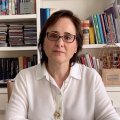
Lourdes Moreno
CEO and shareholder of Bolueta Engineering Group, a group of SMEs that provide industrial machining, lifting and hydraulic supply services. The group is incorporated in 2016 with the acquisition of two companies and is subsequently expanded in 2019. Member of the Executive Commission of Innobasque, the Commission of the FVEM and the Investment Advisory Board of GIIC Fineco. In addition, he is a member of the PCTI 2030 Intelligent Industry Pilotage group, coordinating the work of the SMEs chapter. He was on the Board of Directors of Elkargi and directed Crecer +, a network of private investors focused on investing in start-ups, for 5 years, belonging to several Boards of Directors. She has been a professor at the U. de Deusto and other academic institutions until her investment in Bolueta Engineering. Lourdes worked for 15 years in investment banking mainly in London in the equity, mergers and acquisitions and risks departments for JP Morgan and became co-head for Europe of the Credit Suisse Asset Finance area. She has a degree in Economics and Business Administration from the University of Deusto, an MBA from INSEAD, and a Master's degree from the University of Sussex (United Kingdom).
Ainhoa Ondarzabal Izaguirre
Director of Internationalization of SPRI-Basque Agency for Business Development. Graduated in Information Sciences EHU/UPV (1986-1991), she has a Postgraduate in Cultural Resources Management from the University of Deusto (1994-1995). He enjoyed a Leonardo Da Vinci fellowship from the EU in Germany in 1998, and a DDEC Internationalization fellowship in Ankara (1998-2000). He has also participated in the Business Management Program of the Pan-American Institute of Senior Business Management (IPADE) (2009-2010), Mexico. Her professional career has been developed both in the private sphere where she has worked as a Consultant (Chamber of Commerce, Industry and Shipping of Ankara and Istanbul (2000)), Head of Sales and Business Development (ZF Sachs AG, SAS, Shanghai (2001 /2004)), and Senior Project Manager & Marketing Director (iGeo Invest & Consulting, Shanghai (2006/2008)) and in Public Administration, being Director of the SPRI office in Germany (SPRI)(2013/2014)) and Director of Internationalization (Basque Government)(2014/2018)
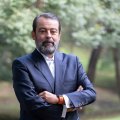
Javier Ormazabal Echevarria
Graduated in Economics from the UPV/EHU (1982-1987), completing his studies at the London Business School and IESE Business School. He has developed his professional career in the Velatia family business, of which he is president (2012-Present). Member of the President's Board of Orgalim (Federation of European technology industries) and founding member of Aefame, the Basque Family Business Association, where he has been president (2015-2019). Member of the Board of Directors of Circle of Basque businessmen, of which he was its president (2018-2021). This activity is combined with his participation in governing bodies of companies, associations and institutions of recognized prestige, such as: the Biscayan Federation of Metal Companies, the North Regional Advisory Council of BBVA, the Novia Foundation Salcedo, the Alejandro Echevarría Foundation and the El Enebro Advisory Council. On the other hand, the 6 years he held the presidency of Tecnalia Research and Innovation stand out, as well as his participation, in the past, as a member of the Advisory Council for Science, Technology and Innovation of the Ministry of Economy and Competitiveness and as a member of the Board of Directors of the Energy Cluster.

Jesus Valero
TECNALIA Research & Innovation, Director General
Doctor in Biology from the UPV/EHU. Master in Marketing and Commercial Management from ESIC Business and Marketing School. Management expert for Biotech companies. More than 25 years of experience in Research and Technology Transfer. From 2019 to 2020 Deputy Director of Technology with responsibility for the entire technological portfolio of TECNALIA, including raising competitive public financing, technological KPIs and transversal activity of TECNALIA. From 2014 to 2019 at the head of the Health Division of TECNALIA, with 80 researchers in the areas of Neuroengineering, Medical Robotics, Biomaterials and Food Ingredients, and with a portfolio of more than 30 patents. During this period he was responsible for the FIK initiative, a €24 million public-private investment company in the Basque Country for the development, transfer and marketing of medical devices, giving rise to companies such as Fesia or Textia. He is currently General Director of TECNALIA. Member of the boards of several companies, including Fesia Technologies and Neos Surgery. Member of the Management Committee of several organizations such as EARTO, FEDIT, BRTA and the Elcano Royal Institute.

María Vallet Regí
Researcher in the field of materials science with applications in biomedicine. He has received numerous national and international awards. He directs the Intelligent Biomaterials Research Group (GIBI), CIBER-BBN, at the Complutense University of Madrid, where he is developing different strategies to cure bone-related diseases such as cancer, osteoporosis or implant infections. She is the author of more than 700 scientific articles, 13 patents and an H of 110. She is the First Spanish scientist according to PLOS Biology (2021) and one of only three women in the ranking of the 100 Spanish researchers with the highest h index in any knowledge area. Member of the Royal National Academies of Pharmacy of Spain (RANFE) and of Engineering (RAING) and fellow of FBSE (Fellow Biomaterials Science and Engineering) and AIMBE (American Institute for Medical and Biological Engineering). She is an honorary doctor from the universities of Jaume I, Rovira and Virgili, Murcia and the UPV/EHU. She was the first woman to receive the gold medal from the Federation of European Materials Science Societies (FEMS) and the George Winter Award from the European Society for Biomaterials (ESB)

Tatiana Suarez Cortés
Doctor in Biological Sciences, University of the Basque Country (UPV/EHU) (2000). She has focused her scientific career on biomedical research. Researcher at the Institute of Immunology of the San Juan de Dios Hospital. Post-doctoral stay at Univ. Thomas Jefferson in Philadelphia (USA) and as invited researcher at the Univ. of Medicine and Dentistry of New Jersey (USA). Project Director and Head of the Functional Biotechnology area, Biotechnology Dept., Gaiker Technological Center (2003-2007). She was founder and scientific director of the company Bioftalmik Applied Research, focused on diagnosis and treatment of eye pathologies (2007-2017) Currently she is Head of Research, Development and Innovation Promotion, at the R+D+i Dept. of FAES FARMA (2017- current). Author of 32 indexed scientific publications, invited to 2 chapters in scientific books and guest editor in international journal of ophthalmology, and co-inventor of 10 patents. Investigator of 45 national and European research projects. She has directed 2 doctoral thesis and 2 master projects. Experience in direction, planning and coordination of translational research, and programs of funding for R+D+i projects and talent promotion.
Summary
Conclusions sent by the direction of the Summer Course
Sustainable development goals
Agenda 2030 is the new international development agenda approved in September 2015 by the United Nations. This agenda aims to be an instrument to favour sustainable human development all over the planet, and its main pillars are the eradication of poverty, a reduction in equality and vulnerability and fostering sustainability. It is a unique opportunity to transform the world up to 2030 and guarantee human rights for all.

3 - Good health and well-being
Guarantee a healthy life and foster the well-being of all people of all ages. Key issues: universal healthcare coverage, sexual and reproductive health, reduction in the number of road accident casualties, pollution and chemical products, reduction in maternal and neonatal mortality, the end of epidemics such as AIDS, combating hepatitis and other water-borne diseases, drug and alcohol prevention, control of tobacco.
More information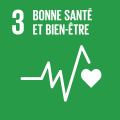
5 - Gender equality
Achieve gender equality and empower all women and young girls. Key issues: the end of all forms of discrimination and violence, recognition of unpaid care and domestic work, shared responsibility, equal opportunities, full and effective participation in reproductive rights, equal rights vis-à-vis economic resources, access to land and other assets and ownership.
More information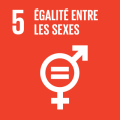
7 - Affordable and clean energy
Guaranteeing access to affordable, reliable, sustainable and modern energy for everyone. Key issues: universal access, increased proportion of clean energies, energy efficiency, research, fostering investments in energy infrastructures and clean technologies, modern and sustainable energy services.
More information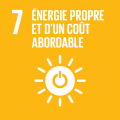
8 - Decent work and economic growth
Foster sustained, inclusive and sustainable economic growth, full and productive employment and decent work for everyone. Key issues: decent work, full and productive employment, entrepreneurship, fostering micro-companies and SMEs, employment rights, safe working environments, youth employment, equal opportunities and pay, strengthening of financial institutions, and breaking the link between economic growth and the degradation of the environment.
More information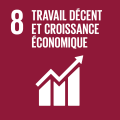
9 - Industry, innovation and infrastructure
Build resilient infrastructures, promote inclusive and sustainable industrialisation and foster innovation. Key issues: reliable, sustainable, resilient and quality infrastructures, inclusive and sustainable industrialisation, modernisation, clean and environmentally rational industrial technologies and processes, scientific research and improvement of technological capabilities, universal access to ICTs.
More information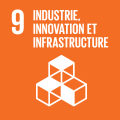
11 - Sustainable cities and communities
Make cities and other human settlements inclusive, safe, resilient and sustainable. Key issues: access to suitable housing and basic services that are secure and affordable, suitable and sustainable transport systems, inclusive urban planning, participative planning and management, protection of cultural and natural heritage, air-quality, green zones, and connections between urban, peri-urban and rural areas.
More information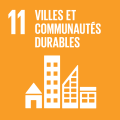
13 - Climate action
Adopt urgent measures to combat climate change and its effects. Key issues: mitigation, resilience and capacity for adaptation, planning, national strategies and plans, education and raising awareness, reduction of effects and early warning systems, compliance with the Framework Convention of the United Nations on Climate Change.
More information